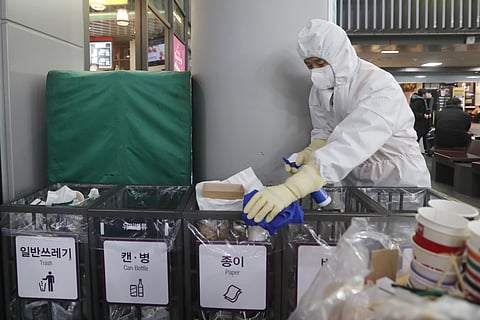

NEW YORK: The first confirmed case of symptomatic COVID-19 can be traced to a female seafood vendor at a wholesale food market in China's Wuhan, not an accountant who lived far away, according to a new study which points out that the WHO inquiry into the origins of the deadly disease may have got the early chronology of the pandemic wrong.
The study states the first patient worked at Huanan live animal market in the central Chinese city, The New York Times reported on Thursday.
Wuhan city is where the coronavirus first emerged in 2019 and spiralled into a pandemic.
The accountant, who was widely thought to be the first person with Covid-19, reported that his first symptoms appeared on December 16, several days later than initially known, Michael Worobey, head of ecology and evolutionary biology at the University of Arizona, said in the study published in the journal Science on Thursday.
"His symptom onset came after multiple cases in workers at Huanan Market, making a female seafood vendor there the earliest known case, with illness onset December 11," the study said.
Worobey, a leading expert in tracing the evolution of viruses at the University of Arizona, came upon timeline discrepancies by combing through what had already been made public in medical journals, as well as video interviews in a Chinese news outlet with people believed to have the first two documented infections, the report said.
Worobey argues that the vendor's ties to the Huanan Seafood Wholesale Market, as well as a new analysis of the earliest hospitalised patients' connections to the market, strongly suggest that the pandemic began there.
"In the city of 11 million people, half of the early cases are linked to a place that's the size of a soccer field," Worobey said.
"It becomes very difficult to explain that pattern if the outbreak didn't start at the market."
Several experts, including one of the pandemic investigators chosen by the World Health Organisation (WHO), said that Worobey's detective work was sound and that the first known case of Covid was most likely a seafood vendor, it added.
But some of them also said the evidence was still insufficient to decisively settle the larger question of how the pandemic began.
They suggested that the virus probably infected a "patient zero" sometime before the vendor's case and then reached critical mass to spread widely at the market.
In January, researchers chosen by the WHO visited China and interviewed the accountant who had reportedly developed symptoms on December 8, 2019. They released a report in March 2021 and described him as the first known case, the report added.
But Peter Daszak, a disease ecologist at EcoHealth Alliance who was part of the WHO team, said that he was convinced by Worobey's analysis that they had been wrong.
"That December the eighth date was a mistake," Daszak said.
The team never asked the accountant the date his symptoms began, he said.
Instead, they were given the December 8 date by doctors from Hubei Xinhua Hospital, who handled other early cases.
"So the mistake lies there," Daszak said.
For the WHO experts, Daszak said, the interview was a dead-end: The accountant had no apparent links to an animal market, lab or mass gathering.
He told them he likes spending time on the internet and jogging, and he did not travel much.
"He was as vanilla as you could get," Daszak said.
Had the team identified the seafood vendor as the first known case, Daszak said, it would have more aggressively pursued questions like what stall she worked in and where her products came from, the report added.
Toward the end of December 2019, doctors at several Wuhan hospitals noticed mysterious cases of pneumonia arising in people who worked at the Huanan Seafood Wholesale Market, a dank and poorly ventilated space where seafood, poultry, meat and wild animals were sold.
On December 30, public health officials told hospitals to report any new cases linked to the market.
Fearing a replay of SARS, which emerged from Chinese animal markets in 2002, Chinese officials ordered the Huanan market closed, and Wuhan police officers shut it down on January 1, 2020.
Despite those measures, new cases multiplied through Wuhan, the report added.
Wuhan authorities said on January 11, 2020, that cases had begun on December 8.
In February, they identified the earliest patient as a Wuhan resident who fell sick on December 8 and had no link to the market.
Chinese officials and some outside experts suspected that the initially high percentage of cases linked to the market might have been a statistical fluke known as ascertainment bias.
They reasoned that the December 30 call from officials to report market-linked illnesses may have led doctors to overlook other cases with no such ties.
The WHO proposed last month a new expert panel to investigate the source of the deadly coronavirus.
China has previously rejected the next stage of a WHO plan to investigate the origins of the coronavirus pandemic, saying the move showed "disrespect for common sense and arrogance toward science".
The global COVID-19 cases on Friday stand at 256,092,392, and 5,132,443 people have died from their infections, according to the Johns Hopkins online dashboard.